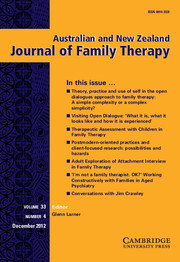Article contents
Frameworks for Practice in the Systemic Field: Part 2 — Contemporary Frameworks in Family Therapy
Published online by Cambridge University Press: 21 February 2012
Abstract
This is the second of two articles to map the landscape of practice theory in systemic family therapy. The first article gave a particular chronology of the development of family therapy practice theory, beginning with the frameworks that emerged in the 1960s-1970s and then tracing the transitional decade of the 1980s. The convergences of three sets of influences — ecosystemic epistemology, the feminist challenge and postmodernist ideas — led to the changed landscape of post-1990 practice theory. This second article picks up at this point, mapping four contemporary influential approaches in Australian family therapy — the Milan-systemic, narrative and solution-focused frameworks, and the dialogical perspective. Social constructionist and narrative ideas together constitute the dominant common theory influence in the post-1990 practice frameworks, although intersected and used in different ways in the different frameworks. Throughout the history of the development of practice theory, context and relationship remain the enduring parameters of the systemic family therapy field.
- Type
- Articles
- Information
- Australian and New Zealand Journal of Family Therapy , Volume 32 , Issue 2 , 01 June 2011 , pp. 87 - 108
- Copyright
- Copyright © Cambridge University Press 2011
- 12
- Cited by


